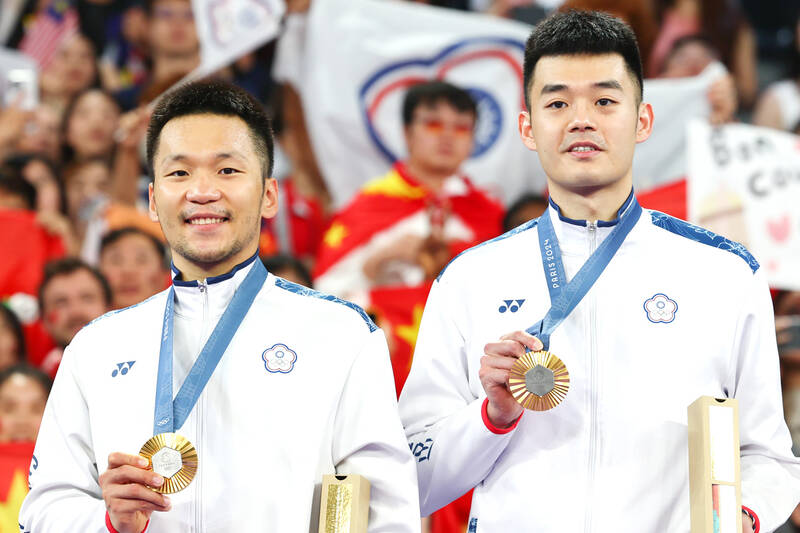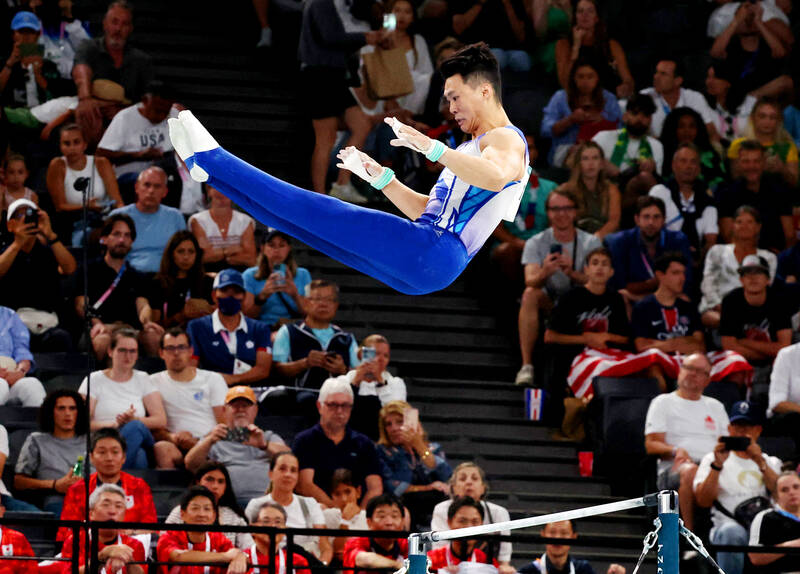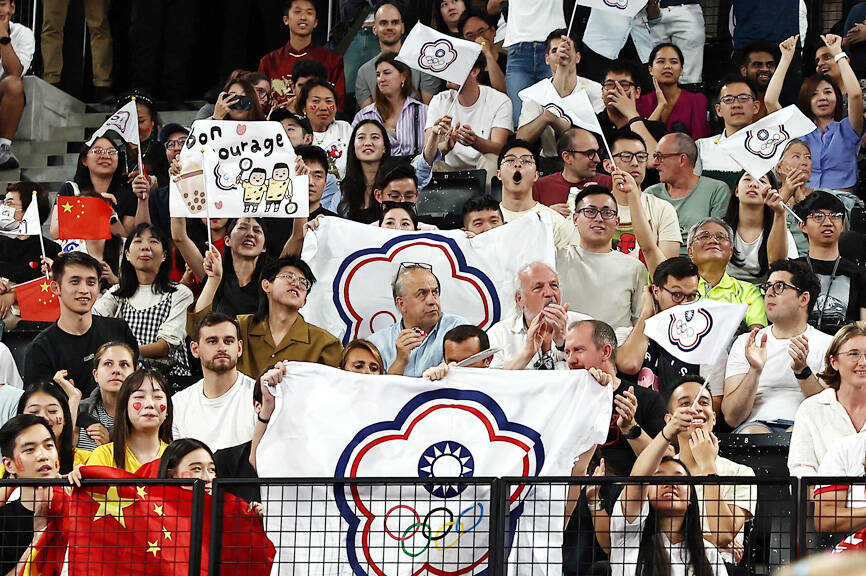Taiwanese badminton duo Lee Yang (李洋) and Wang Chi-lin (王齊麟), who won gold at the Tokyo Olympics in 2021, on Sunday expressed their gratitude to fans for their support after they defended their title in Paris.
“The cheers of fans were huge [to me]; that’s pretty much what kept me going,” Wang told a news conference after the final.
The reigning champions secured back-to-back golds by upsetting world No. 1 duo Liang Weikeng (梁偉鏗) and Wang Chang (王昶) of China in a 76-minute marathon, which ended 21-17, 18-21, 21-19.

Photo: CNA
Lee shared a similar sentiment and said he was particularly touched when the audience joined them in singing the national anthem after they were awarded the gold medals, a moment he referred to as “beyond words.”
Joking that he had wanted to get some popcorn and take a seat to enjoy the show along with the nearly 1,000 spectators packed in the La Chapelle Arena, Lee said he had never expected this to happen.
“There were no spectators at the Tokyo Olympics, so it was just the two of us singing the song. This time, with all the fans singing it together, it is hard to describe that feeling,” he said.

Photo: Reuters
The two-time Olympic gold medalists said that they had a hard time overcoming the Chinese pair, and they felt their energy draining when they failed to secure the second game, which would have won them the match.
“Lee Yang challenged me, asking: ‘Are you tired?’ before the third game, and that got me locked in again,” Wang said, adding that the fans’ cheers were equally important.
“We definitely could have taken them down in the second game, but I screwed it up because I was in such a hurry,” said Lee, who added that he calmed down after thinking about his plans to travel abroad after the Games.

Photo: Ann Wang, Reuters
After holding off world No. 2 duo Anders Skaarup Rasmussen and Kim Astrup of Denmark on Friday, Lee and Wang became the third male pairing to make it to two consecutive Olympic finals. None of the previous duos took gold in both.
The only Olympian shuttler to have won gold twice in the men’s doubles was China’s Fu Haifeng (傅海峰), who won at London 2012 and Rio de Janeiro 2016 with different partners.
The gold was Taiwan’s eighth ever at the Games. The nation has won at least one gold medal in the past six competitions, starting in 2004 in Athens.
With the latest glory, Lee and Wang became the team’s first shuttlers to win two medals. Wang, 29, also became the oldest Taiwanese Olympic gold medalist ever, a record previously held by weightlifter Kuo Hsing-chun (郭婞淳), who was 27 when she triumphed in Tokyo.
Although the victory suggests there could still be gas in the tank, Lee, 28, said he has not changed his plan to retire at the end of this season.
“Last dance, this is for you,” he wrote on Facebook following the final, with a picture showing him pointing to the Olympic logo outside the stadium.
Instead of staying on the court, he expressed an interest in promoting the sport in Taiwan after hanging up his racket.
“I have no idea whether there is a position for me, but I really want to promote badminton in Taiwan if the opportunity is there,” he said.
Minister of Education Cheng Ying-yao (鄭英耀) yesterday said that he heard Lee’s wish and that he would help him fulfill his dream and allow the world to see Taiwan’s contribution to the sport.
Meanwhile, Taiwan yesterday bagged another medal after gymnast Tang Chia-hung (唐嘉鴻) clinched a bronze in the men’s horizontal bar event.
Tang, who finished seventh in the all-around event at the Tokyo Olympics three years ago, but missed the horizontal bar final, made a strong comeback after an Achilles tendon injury, topping three of the four horizontal bar qualifiers leading up to the Paris Games.
On a night when six of the eight finalists either failed to catch the bar or fell to the mat on their dismounts, Tang’s score of 13.966 was good enough for a tie for third place with China’s Zhang Boheng (張博恆).
Zhang came in as one of the favorites for gold after edging Tang by 0.2 points in the qualification round.
The gold medal went to Japanese gymnast Shinnosuke Oka, while the silver went to Angel Barajas of Colombia.
Additional reporting by Rachel Lin

The US government has signed defense cooperation agreements with Japan and the Philippines to boost the deterrence capabilities of countries in the first island chain, a report by the National Security Bureau (NSB) showed. The main countries on the first island chain include the two nations and Taiwan. The bureau is to present the report at a meeting of the legislature’s Foreign Affairs and National Defense Committee tomorrow. The US military has deployed Typhon missile systems to Japan’s Yamaguchi Prefecture and Zambales province in the Philippines during their joint military exercises. It has also installed NMESIS anti-ship systems in Japan’s Okinawa

‘WIN-WIN’: The Philippines, and central and eastern European countries are important potential drone cooperation partners, Minister of Foreign Affairs Lin Chia-lung said Minister of Foreign Affairs Lin Chia-lung (林佳龍) in an interview published yesterday confirmed that there are joint ventures between Taiwan and Poland in the drone industry. Lin made the remark in an exclusive interview with the Chinese-language Liberty Times (the Taipei Times’ sister paper). The government-backed Taiwan Excellence Drone International Business Opportunities Alliance and the Polish Chamber of Unmanned Systems on Wednesday last week signed a memorandum of understanding in Poland to develop a “non-China” supply chain for drones and work together on key technologies. Asked if Taiwan prioritized Poland among central and eastern European countries in drone collaboration, Lin

The Chien Feng IV (勁蜂, Mighty Hornet) loitering munition is on track to enter flight tests next month in connection with potential adoption by Taiwanese and US armed forces, a government source said yesterday. The kamikaze drone, which boasts a range of 1,000km, debuted at the Taipei Aerospace and Defense Technology Exhibition in September, the official said on condition of anonymity. The Chungshan Institute of Science and Technology and US-based Kratos Defense jointly developed the platform by leveraging the engine and airframe of the latter’s MQM-178 Firejet target drone, they said. The uncrewed aerial vehicle is designed to utilize an artificial intelligence computer

Renewed border fighting between Thailand and Cambodia showed no signs of abating yesterday, leaving hundreds of thousands of displaced people in both countries living in strained conditions as more flooded into temporary shelters. Reporters on the Thai side of the border heard sounds of outgoing, indirect fire yesterday. About 400,000 people have been evacuated from affected areas in Thailand and about 700 schools closed while fighting was ongoing in four border provinces, said Thai Rear Admiral Surasant Kongsiri, a spokesman for the military. Cambodia evacuated more than 127,000 villagers and closed hundreds of schools, the Thai Ministry of Defense said. Thailand’s military announced that